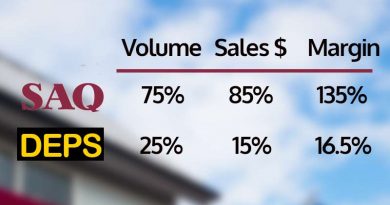EXCLUSIVE: Lucienne Robillard UNHAPPY with SAQ’s monopoly statu quo
The well-known personality to which the liberal government of Philippe Couillard entrusted the delicate task of reviewing programs in 2014 and whose committee became associated with her name, came out last week for the first time since the publication of her final report almost two years ago, in August 2015, to deplore the government’s inaction regarding the current SAQ monopoly on the sale of wine and liquors in Quebec (note : SAQ stands for Société des alcools du Québec, which enjoys a long-standing monopoly on the sale of wine and liquor since last century’s prohibition in the U.S).
In an exclusive interview with DepQuébec, Ms. Lucienne Robillard, former Chair of the Program Review Committee and former Chair of the Treasury Board in Ottawa, expressed disappointment that nothing has been done to date to open the wine and liquor market to some form of competition in Quebec.
“Our report denounced the lack of efficiency of the SAQ. While it did not recommend to privatize it, it strongly suggested to liberalize the wine and liquor market to allow open competition through specialized wine stores or others. But for the last two years, the government has only acted on the efficiency side of the issue. As for liberalization, nothing has been done, ” said Ms. Robillard during a social gathering in Chambly.
Indeed, the SAQ has, for some time (see here, here and here), been increasing its efforts to raise productivity. Recently, layoffs have been announced, but also a series of wine price reductions, which have long been — and still are to a large extent — much more expensive than the same wines offered by the neighbouring LCBO in Ontario.
Asked whether Finance Minister Carlos Leitao’s frequent openings about a change of model was only a means of putting pressure on the SAQ to reduce its costs, Ms. Robillard reiterated that “nothing has been done to liberalize the Quebec wine and liquor market for the last two years”. Last March, La Presse, a Montreal French language daily, reported that Minister Leitao seemed to be putting liberalization on the back burner, seeming quite satisfied with the downsizing efforts provided by the SAQ so far.
Ms. Robillard was appointed by the Couillard government in June 2014 to head its program review committee (see this Radio-Canada feature), a few months after the election of the Liberal government of Philippe Couillard. Faced with the government’s critical state of public finances, the committee has been created to implement a permanent program review mechanism and to seek $ 3.2 billion in budget savings for the following year. A first report, released in November 2014, identified 2.3 billion of savings but the measures, judged too drastic, were then denounced unanimously by the municipal,, agricultural and major trade unions lobbies. Then, a final report, published in 2015, proposed a new set of measures, including “ending the monopoly” held by the SAQ by “liberalizing the wine and liquor market”.
“You know, the SAQ, from our point of view, is not worth anything. In fact, it is its monopoly status that gives it a certain value. What we need to do is liberalize. […] We do it for alcohol, for cigarettes. […] The SAQ in there will have to compeete, “said Commissioner Robert Gagné.
Two years after the report publication, very few of the specific recommendations proposed by the committeee have been endorsed to date by the government. On its website, the Secrétariat du Conseil du trésor (Quebec’s Treasury Board) states very vaguely that, following the committee’s recommendations, “a program review mechanism has been set up at the governmental level.”
A remarkable declaration in several respects
This public declaration to which Ms. Robillard agreed to last week is remarkable insofar as she is not known to stir up controversy or to speak out loud.
A great lady of Quebec and Canadian politics, Lucienne Robillard served for 17 years as a member of Parliament for a ruling party in both Quebec and Ottawa. Elected as a Member of the National Assembly under the Liberal Party in 1989, she was Minister of Cultural Affairs and Minister of Education and Science under Robert Bourassa and Minister of Health and Social Services under Daniel Johnson. In the next general election, she was defeated in her riding of Chambly. After becoming the Quebec wing President of the Liberal Party of Canada, she was elected as the Member of Parliament for Westmount-Ville Marie on February 13, 1995 until January 25, 2008 under the reigns of Jean Chrétien and Paul Martin. In the Chrétien government, she held several ministerial positions, including Minister of Labor, Minister of Citizenship and Immigration, and President of the Treasury Board. Under Paul Martin, she was Minister of Industry, Minister of Intergovernmental Affairs and President of the Privy Council. After the defeat of the Liberals in the 2006 Canadian federal election, she was appointed Deputy Leader of the Opposition. She resigned from her position in January 2008 (sources: National Assembly and Wikipedia).
Her prolific political career spans four decades, and she can claim to be one of the only, if not the only, politicians to have filled a ministerial office in Quebec City and Ottawa.
Her track record, her credibility, her skills and her long-standing membership in the party have undoubtedly weighed heavily when Prime Minister Philippe Couillard chose her at the beginning of his mandate to carry out this delicate operation aimed at identifying major reforms of the government in order to improve public finances and satisfy the appetite for change from a good portion of the electorate which is among the most heavily taxed in North America. Her unwavering liberal allegiance throughout her career makes her last week’s declaration even more striking considering the Liberal Party’s secretive culture, which usually favors the settlement of divergent point of views behind closed doors instead of in public, through third-party media.
That Ms. Robillard chose this option most probably reflects her profound exasperation at the inertia and lack of determination of the Liberal government to reform the SAQ monopoly, which seems to want to linger forever.
Photo credit: DepQuébec: Lucienne Robillard in Chambly, Wednesday June 14, 2017.
————————————————————-
The Robillard Commission at a glance:
Name: Program Review Committee
Mandate: To make recommendations of program revisions in collaboration with departments and agencies, and taking into account the views expressed by third-party groups. Identify program revisions to help meet budget targets for fiscal year 2015-2016, as defined in the 2014-2015 budget.
Duration: June 11, 2014 to August 31, 2015
Members:
Chair: Lucienne Robillard
Commissioners:
- Claude Montmarquette, Economist
- Robert Gagné, Economist
- Michèle Bourget, former public servant
- Mireille Fillion, former public servant
Highlights:
JUNE 2014: Announcement of Lucienne Robillard as President and economists Claude Montmarquette and Robert Gagné as well as former state administrators Michèle Bourget and Mireille Fillion as commissionners.
NOVEMBER 2014: Tabling of the first report proposing $ 2.3 billion of potential savings to eliminate the budget deficit in the following year. Proposed savings include: cuts into the financial assistance to municipalities (up to $ 1.3 billion), cuts into assistance to farmers ($ 300 million), reduction of the educational child care budget ($ 378 million $), etc.
JUNE 2015: Publication of the second report summary entitled Looking for Performance.
AUGUST 2015: Tabling of the final report proposing, among other things, the transfer to Ottawa of the provincial taxes collection and the liberalization of the wine and liquor market in Quebec.
Useful links :
First part of the Report of the Permanent Review Committee (November 2014)
Second part instituted Looking for Performance (June 2015)
Reaction of the SAQ to the Robillard report






